SEOULITE ISSUE 2
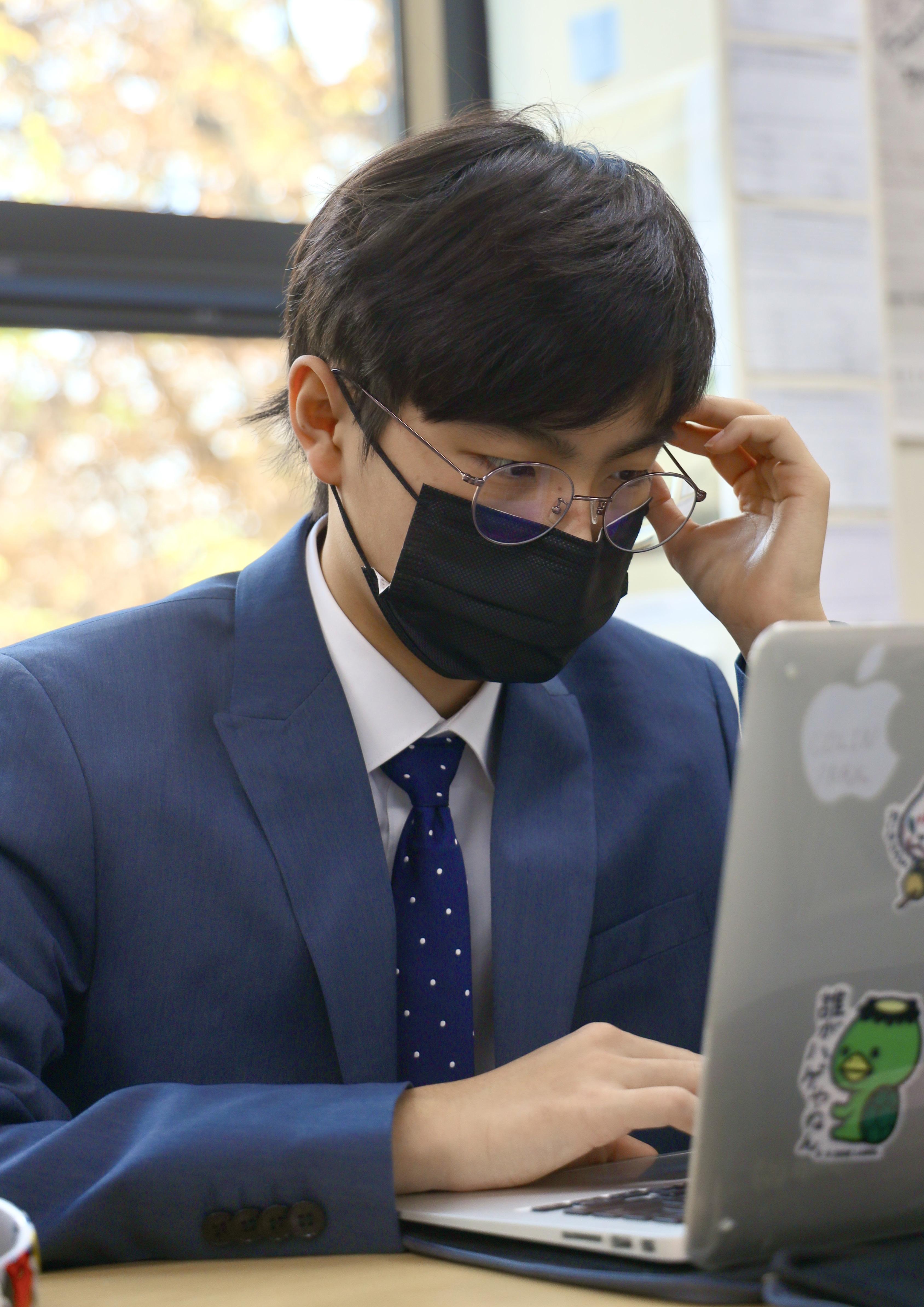

XXV
SEOULITE CONTRIBUTORS 2022
Editors-in-Chief
Aimee Choi, Rosa Suh
Managing Editors
Clair Kang, Grace Lee
















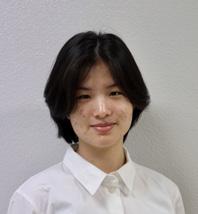






Copy Editors
Lauren Kim, Chelsea Kim
Layout Editors



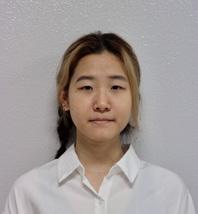
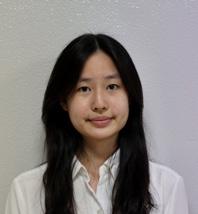





Yuzine Yi, Eunice Rhee
Photo Editors
Alice Lee, Chloe Cho
Copy
Sean Kim, Ellen Park, Jiyu Hong, Lin Chi ang, Jason Lee, Lucy Jang, Charlotte Jun, Jennie Koh, Kris Son, Sophie Choi
Layout Photo
Edward Yoon, Kaylee Kim, Ellen Ryu, Luna Moon, Silvia Lee, Hannah Kim
Julie Koh, Dana Chung, Kristina Kang, Bel la Youm, Celine Yang, Jasmine Cho, Anna Lee
Advisor
Ms. Wendy Grant
LETTER FROM THE EICs
Honorable delegates, chairs, advisers, and guests,
We are honored to serve as the editors of Seoulite, the official press publication of SEOMUN. We would like to celebrate delegates and chairs for attempting to tackle the most urgent issues in an ever complicating world and organizers for creating the space necessary to do so. Though SEOMUN may merely enact the events of a UN conference, it sparks the same dedication for making the world a better place.
This year’s theme, Bonds of Unity, says—whether through globalization, the Internet, or even common interests—that we are more connected to others than what we may usually think.
Journalism has been one of the most pervasive ways of reminding us of this shared humanity. For the last three years, Seoulite has brought together delegates separated by the pandemic and combined their stories on the same page. We hope that, with the four issues Seoulite will publish throughout the conference, we will once again remind you that even separated by im mense distances, all delegates share the same zeal for the betterment of the world.
We would like to ask the delegates and chairs for two things:
First, please take the time to look through our daily issues on issuu.com. We promise to fill its pages with diverse and engaging content ranging from debates being passed in GA I to which songs best represent SEOMUN.
Second, if a press member approaches you for an interview, please spare a few minutes. We will try our best to request a non-invasive time, but on rare occasions that might not be possible. We welcome your uncensored and personal opinions!
We wish all delegates the best of luck. Happy SEOMUN XXV!
Aimee Choi & Rosa Suh Co-Editors-in-Chief

JUKEBOX JEWELS
SEOMUN XXV: AN ETERNAL FLAME OF HOPE
Amidst the deafening discord and friction of the world, hope feels like nothing more than a mere concept. Society has become discomposed and unable to cooperate to formulate compromises that cater to the needs of all citizens with numerous factional conflicts arising every day. For the past two decades, SEOMUN has strived to combat this issue through its annual conferences between passionate delegates who care for the well-being of the world. This year, SEOMUN XXV strived to utilize the strength of unity to grasp the hope that has been slowly seeping out of the world in hopes of granting justice to the victims of the selfish greed of society.
“Stronger” - Kelly Clarkson

“Stronger” by Kelly Clarkson is a reminder to have courage even during times of deep despair. Through this song, Clarkson inspires her listeners to “stand a little taller” instead of shying away from challenges. All MUN participants come to their conferences with two things: hope and a unanimous goal of attaining peace. “Stronger” resonates with these MUN participants, motivating the delegates to maintain hope and continue to fight for a harmonious society.
“Hold On” - Justin Bieber
This catchy R&B song comforts and reassures listeners to push on with their lives, even though adversities stand in every corner they turn to. “Hold On” acknowledges and validates the pain and emotional burdens felt by people going through tough times, and encourages them to not give up. This song by Justin Bieber reflects the mindset of MUN delegates as they diligently and resiliently push through the second day of SEOMUN, no matter what challenges come their way. Just like the song repeats, delegates should “hold on” and remind themselves that “we all make mistakes.”


“Fight Song” - Rachel Platten
This heartwarming pop song reminds listeners that there is still fight left in them, and that they should not give up in low points in their lives. The touching lyrics of “Fight Song” symbolize MUN delegates’ tenacity and rigor as they continue to debate for world peace, unity, and equality. Even though “nobody else believes” the potential of MUN delegates, they should never lose faith in themselves and test their own limits with the mentality that they still have “a lot of fight left in” them, and carry on until the very last moment of SEOMUN.
Written by Chelsea Kim and Lauren Kim Layout by Luna Moon
4
STUFF DELEGATES SAY
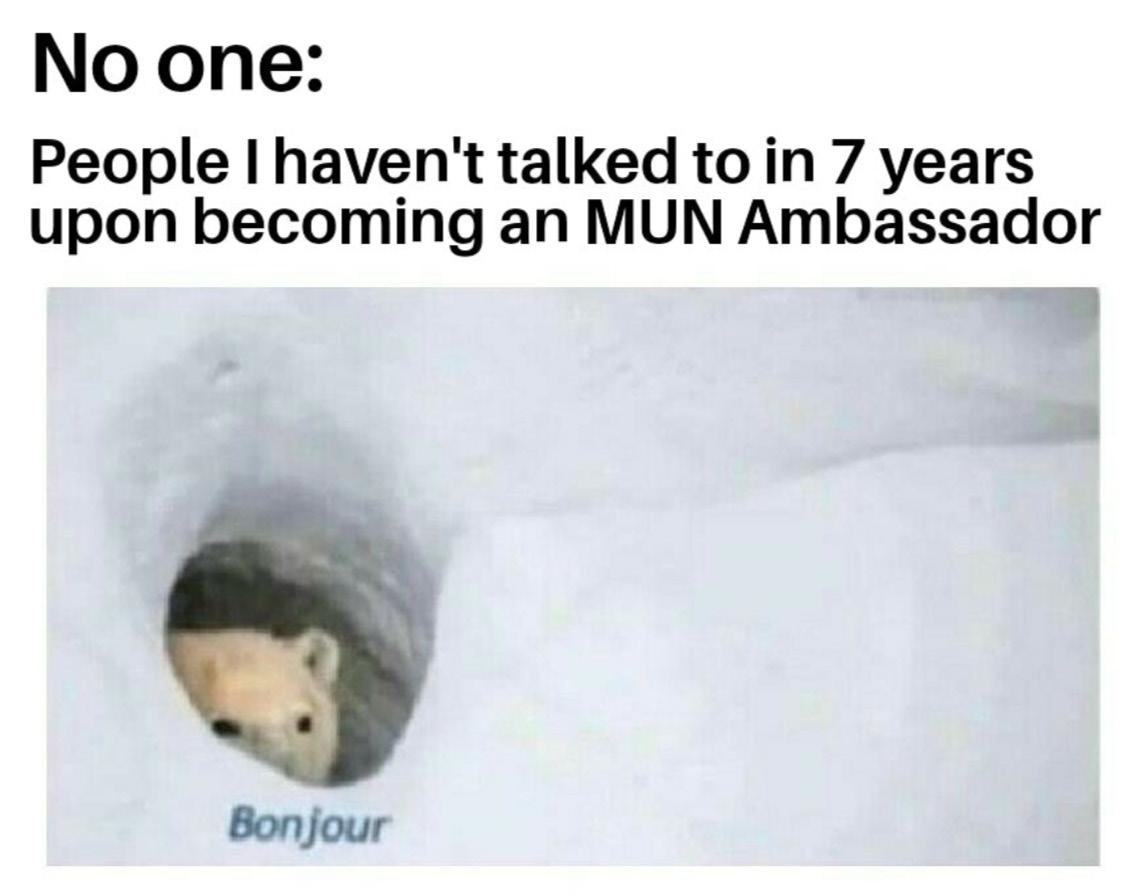
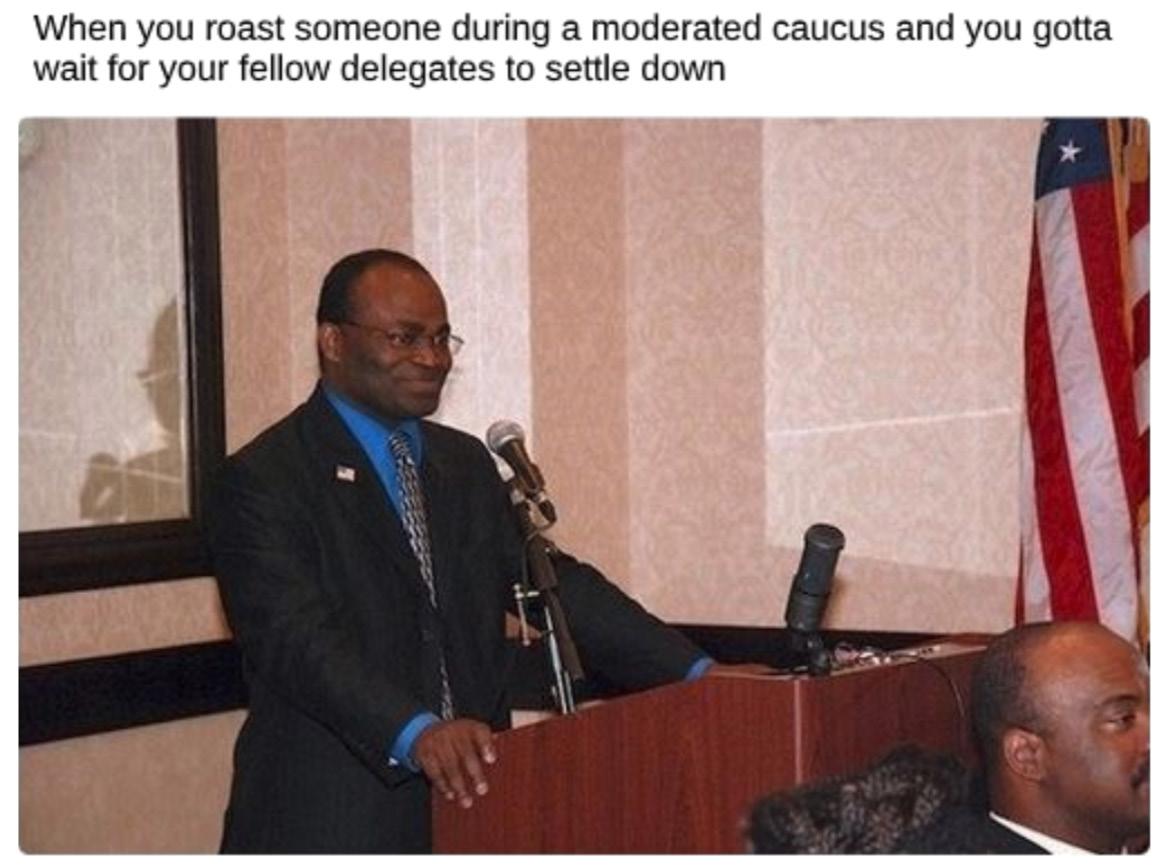


5
Written by Clair Kang and Grace Lee
Layout by Luna Moon
GA RESOLUTION STIRS MIXED REACTIONS
On the second day of SEOMUN XXV, dele gates of the General Assembly (GA) de bated over an amendment proposed by the delegate of France that addressed the role of private military companies (PMC). The amendment strived to redefine PMCs by re ferring to them as combatants rather than civilians. Initially, countries were mostly di vided in their reactions to this amendment.
The delegate of Argentina expressed sup port for France’s amendment on global se curity, arguing that the Geneva Convention lacked a strong definition for PMC combat ants. The delegate argued that forming a clear depiction of PMC combatants would allow for sentenced individuals to face prop er consequences. Yet, the delegate of Iran disagreed with the amendment due to re dundancy issues, pointing out that a change in definition was previously stated in an other operative clause. In response, the del egate of Argentina refuted Iran’s claim by emphasizing that the amendment added specificity to the previous operative clause.
“The delegate of Iran initially thought that there was a direct source of redundancy re garding PMC violations that did not need to be mentioned again,” said Hyungjoon Choo, the delegate of Iran. “However, after the del egation of Argentina stated that there were separate measures addressed in the amend ment, this delegate decided to vote for it.”
Other delegates also raised some concerns about the amendment, such as the delegate of South Africa who believed that provid ing a narrow definition of PMC combatants would exacerbate the issue of accountability. The delegate further identified the amend
ment’s slight vagueness and voiced con cerns about its practicality. Because of such flaws in the amendment, some delegates voted against it in the final voting session.
“I believe it was not clear where the defi nition would be added to,” said Sonali Desh pande, the delegate of South Africa. “Would it be added to the law of member states or the Geneva Convention? Furthermore, the delegate is concerned that applying a strict definition on PMCs would result in them seek ing legal loopholes to avoid consequences.”
Nearing the end of the debate, the dele gate of Argentina argued in his final speech that previous amendments did not directly specify the definition of PMCs, and a clear definition would aid efforts to bring them to justice. Most delegates who previous ly held reservations were convinced by this speech, with the final vote resulting in an overwhelming majority for the amend ment—15 votes for and 2 votes against.
“The delegate of Spain believes that the amendment stated by the delegate of France was valid in terms of designating a name to the PMCs that distinguished them as com batants rather than civilians,” said Seoin Yoon, the delegate of Spain. “Though the dele gate believes that the wording itself might need change to accommodate all states’ opinions, making a designation will help nations distribute suitable punishments.”

6
Written by Sophie Yejin Choi
Photo by Bella Youm Layout by Hannah Kim
ECOSOC PROPOSES AMENDMENTS TO PROTECT WOMEN’S RIGHTS
On the second day of SEOMUN XXV, the Eco nomic and Social Council (ECOSOC) debat ed various amendments concentrated on pro tecting women’s rights. The discussion started with a general consensus on the amendment proposed by Alex Tao, the delegate of the Peo ple’s Republic of China, with regards to opera tive clause seven, which encouraged strength ening individual nations’ legal framework to protect the basic rights of women and enable opportunities in economical, political, and so cial spheres. The delegate argued for the need to strike operative clause seven, and this action was widely supported by the other delegates.
“[This delegate] thought that it was important to strike it because it was redundant, subjec tive, and also infringed on some nations’ right to self-governance,” Alex said. “Sub-clause A is a fundamental infringement on many Islamic nations’ beliefs, and Saudi Arabia and Iran have specific laws that are directly contrary to the sub-clause. This applies to sub-clause C as well.”

There were also amendments that sparked contentious debates among delegates. One such amendment proposed to strike operative clause four, which called upon governments to pass laws that refused to tolerate any form of gender violence in the workplace. Some delegates believed that it had some weak points, arguing that it required elaboration and fewer overlapping areas with other clauses.
“[This delegate] is of the opinion that opera tive clause four was controversial and flawed,” said Annie Son, the delegate of New Zealand. “It was lacking in detail, and it overlapped with intentions that were expressed in clause eight. If you compare operative clause eight, its subclause A, and its sub-sub-clauses with opera
tive clause four, they both address the issue of harassment and gender violence in workplaces.”
However, other delegates agreed with clause four, believing it effectively addressed the issue of workplace violence by calling for direct gov ernment action. They also concurred with how the clause focused on the moral implications of workplace harassment and the negative im pact it would have on a nation’s economic de velopment, both in the short and long term.
“[This delegate] would not like to strike oper ative clause four since it addresses the issue of violence and discrimination against women and girls,” said Seojung Gu, the delegate of Nigeria. “It suggests solutions to improve the working space for women; additionally, the violence exerted against women affects women’s rights, which is why we have this clause to prevent such violence.”
It is evident that there were many amend ments that overlapped with one another, leading to issues of redundancy that many delegates pointed out and disagreed with. Despite this, the delegates of ECOSOC ul timately efficiently tackled these matters.
7
Written by Jennie Koh
Photo by Bella Youm Layout by Hannah Kim
UNHCR GRAPPLES FOR JUSTICE IN REFUGEE CAMPS
Onthe second day of SEOMUN XXV, dele gates of the United Nations High Com missioner on Refugees (UNHCR) engaged in an intense debate regarding the protection of refugees against sexual assault and rape. To com bat the matter of sexual violence in refugee camps, delegates brainstormed ways to improve the standard of living for women. The main submitter—the dele gate of Italy—encouraged coop eration among member nations to create a strong and effective resolution, and the committee was able to take a step closer to achieving justice for refugees.
“The delegate firmly be lieves in the importance of this issue as a representative of It aly,” said Arisu Babakhani, the delegate of Italy. “As a country with over 5,500 refugee camps, and with 500,000 people having sought refuge in Italy since 2014, ensuring the protection of these people is an utmost priority of Italy’s delega tion to the UNHCR.”
Pointing out the responsibility of Italy in protecting fundamental human rights of refu gees, other delegates reached an agreement to make the prevention of sexual violence the committee’s utmost priority. One solu tion proposed by Michelle Kim, the delegate of Japan, was to encourage schools with high
refugee populations to provide education re garding sexual violence and harassment by holding assemblies.
“Educating refugees on ways to defend themselves from sexual violence and learn safe reproductive measures would improve the lives of those living in refugee camps,” Mi chelle said. “The first step in solving the priori tized issue of sexual violence is to ensure that refugees have access to a safe asylum.”
All delegates of the committee advocated taking a uniform approach. Due to the preva lence of this issue among countless nations, an effective measure was necessary to reduce global sexual harassment rates—and for this, many agreed on the necessity of protecting privacy to ensure the safety of refugees. Al though there were already existing measures in place to solve this pressing social issue, there was an insufficiency in programs and policies to mechanize the prevention of secu rity breaches.
“The protection of privacy, especially for vulnerable individuals like refugees, should be further prioritized,” said Jian Hong, the delegate of Argentina. “This is especially so because a violation of such rights to privacy could lead to even more human rights viola tions or refugees feeling unsafe in a foreign nation.”

The debate to restore the fundamental rights of refugees by establishing protection and education of sexual violence was success ful in concluding upon a consensus.
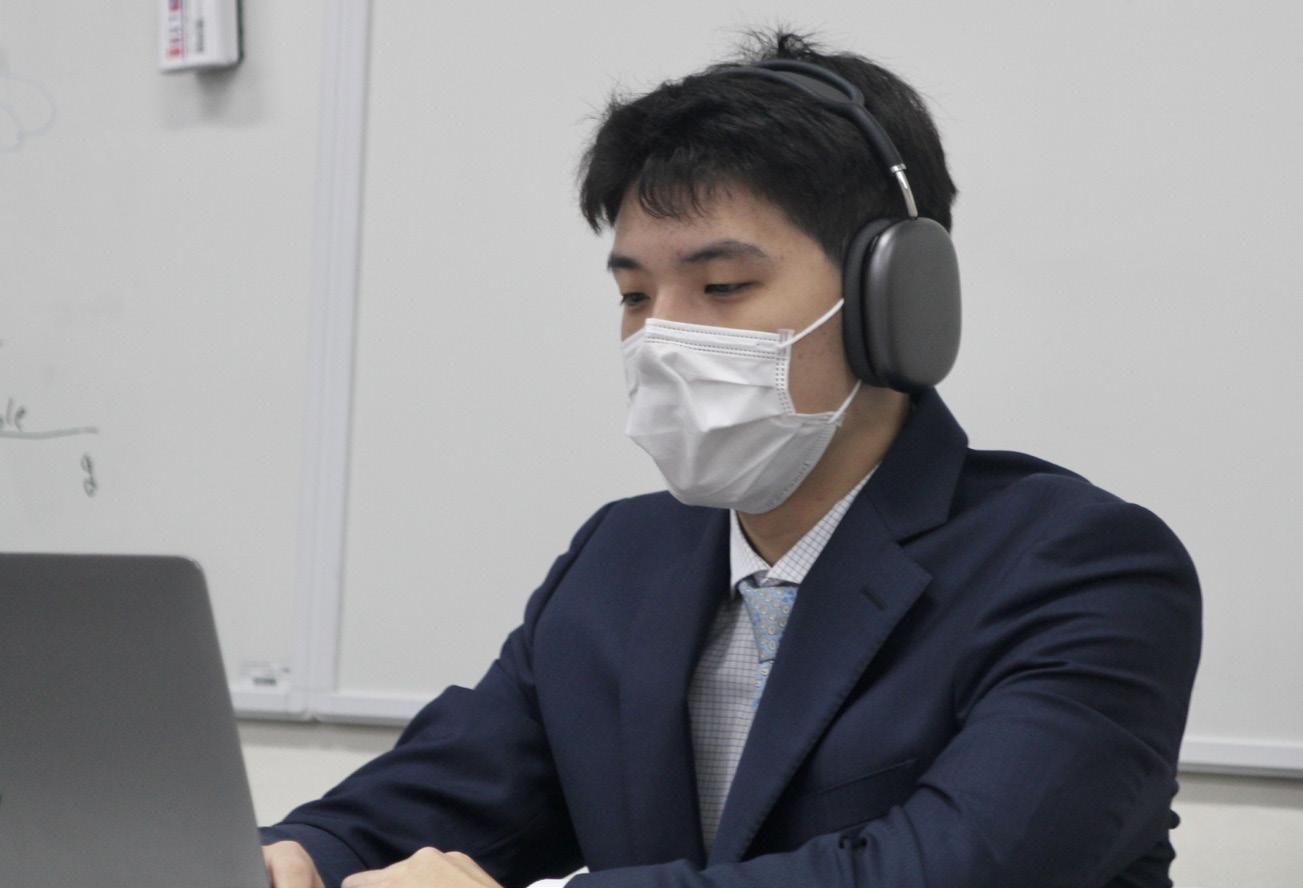
8
Written by Jennie Koh
Photo by Anna Lee Layout by Edward Yoon
WHA ACTIVELY DEBATES EQUAL ACCESS TO VACCINES
On the second day of SEOMUN XXV, delegates of the World Health Assembly (WHA) contin ued to tackle issues regarding universal health care and equal access to vaccines. The delegates considered an array of proposed amendments to address these problems and effectively com municate with one another as to which amend ments they agreed or disagreed with. Some del egates, while not fully disagreeing with certain amendments, brought up flaws they observed in some clauses, such as Philip Yoon, the dele gate of Columbia.
“I disagreed with the amendment submitted by the delegate of Argentina, which was about holding regular, peaceful conferences between experts from the World Health Organization and leaders in indigenous communities to promote vaccinations,” said Philip. “This delegate believes that there are not enough incentives for those indigenous leaders, who do not believe in vac cines, to attend these meetings.”
With the issue of vaccinations being a con troversial one, especially with the prevalence of COVID-19, there were many differing opinions on the passing of amendments. For example, the sub-sub clause from clause one, which pro moted creating a secondary guideline for which nations will be prioritized when receiving vac cines, had proponents such as Seong Been Yoo, the delegate of Italy, who believed it to be ex cessive.
“We are currently debating on the issue of equal access to vaccines and most amend
ments focused on specificity,” said Seong Been. “Clause one, sub-clause C, sub sub-clause five, caused much controversy as it was redundant and could be found elsewhere. Vaccination rates should be known already by the government of each nation and could further be found online, so there’s no need for vaccination rates to be on the secondary guidelines.”
However, other delegates, such as Haven Cha, the delegate of Argentina, believed that adding vaccination rates as an amendment was neces sary, as it could be beneficial to the resolution as a whole. Delegates argued that they would help in easily notifying other countries as to which nations have low numbers of vaccines, as well as helping nations that require more extensive aid.
“This delegate believes that adding vacci nation rates as an amendment is crucial,” said Haven Cha, delegate of Argentina. “Although [vaccination rates are] available online, as other delegates have pointed out, adding vaccination rates to secondary guidelines mandates nations to consider them when deciding which nations to prioritize.”

Overall, although there were many differing opinions on the amendments, which the dele gates and chairs of WHA detected, the delegates recognized the importance of considering all of these different perspectives when coming to a decision on them, concluding that the amend ment be passed.
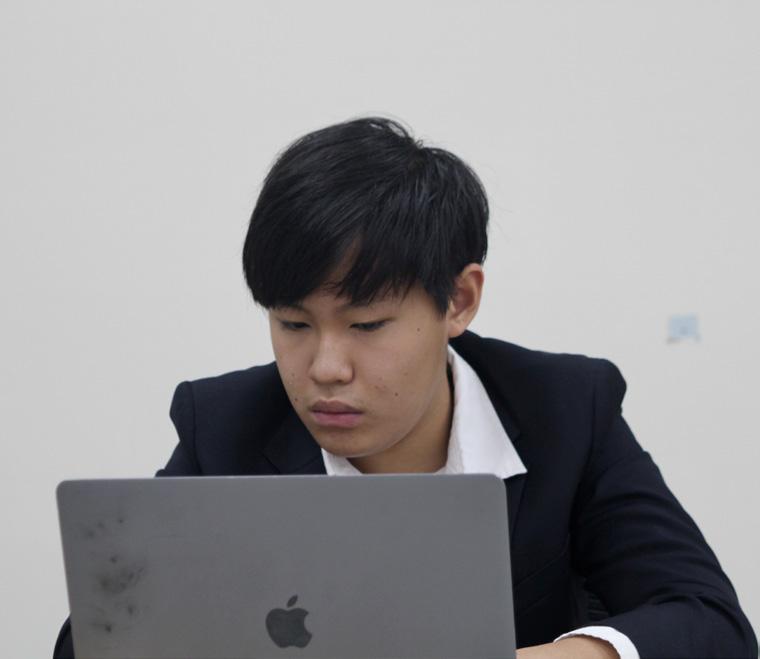
9
Written by Charlotte Jun
Photo by Anna Lee
Layout by Edward Yoon
HRC DEVICES MEASURES TO STRENGTHEN POLICE ACCOUNTABILITY
On the second day of SEOMUN XXV, the Human Rights Council (HRC) emphasized the need for in creasing funding and the duration of the training pe riod of the police to decrease police brutality, brain storming methods to increase transparency within the force. Some delegates stated that using social media platforms monitored by the UN and non-gov ernmental organizations would prevent the spread of false information and raise awareness on the is sue. Many delegates’ stances were directed to the funding of police when dealing with police brutality.
“I am very excited to be at SEOMUN and take part in debates surrounding essential issues pertaining to the rights of people across the world,” said Skye Joung, the delegate of Australia. “Because this is only my second conference and my first time tak ing a more active role in the debate, I was a little scared during the beginning. However, I was very im pressed with the radical measures delegates offered to tackle the problems present within police forces. I definitely agree with the point to increase funding.”
Nonetheless, there were some clashes in opinions during the second day of the conference. The dele gate of France recognized that the lack of specifici ty in the UN guidelines around the police should be addressed before being officially implemented. The delegations of Argentina, Poland, Israel, and Tur key asked the delegate of France why the delegate thought that the UN guidelines were flawed and they restated that they were not opposing any spe cific country but merely claiming that the guidelines needed to be re-evaluated before being affirmed. Other delegates had issues with the delegate of Aus tralia’s resolution because of its unspecific guidelines.
“The Democratic People’s Republic of Korea’s stance is that more oversight is needed in police forces and possibly more funds for training,” said Ali Nariman, the delegate of DPRK. “The amendment submitted by Australia addresses the issue of accountability of police actions, so I agree with the resolution, but be cause it has several shortcomings, other amendments
regarding the oversight of funds may be necessary.”
Following up, the delegate of Australia stated that it was crucial to establish a more defined system of accountability for police forces to ensure there would be sufficient evidence in times of conflict. The dele gate further asserted that there was an urgent need for the addition of body cameras for all police forc es and increased stringency in the system of pun ishment for cases of mistreatment and violence. The delegate of Poland, however, believed the amend ment by Australia was not feasible because nations such as the DPRK would refuse to accept such sys tems of accountability. Stating that every nation has varying degrees of accountability for their police forces, the delegate argued that it would be more practical for nations to decide for themselves how much responsibility they should be given. Keanu Park, the delegate of the Republic of Turkey, believed that police brutality should be decreased and police should be funded in order to provide a clear and positive environment for both police and citizens.
“Considering that the amendment by Australia puts accountability on the officers and makes the system more transparent, Turkey’s stance on the amendment is one of positivity,” Keanu said. “How ever, the issue with sub-sub-clause 2 is that it only vaguely writes about increased stringency in the sys tem of punishment instead of being more specific.”
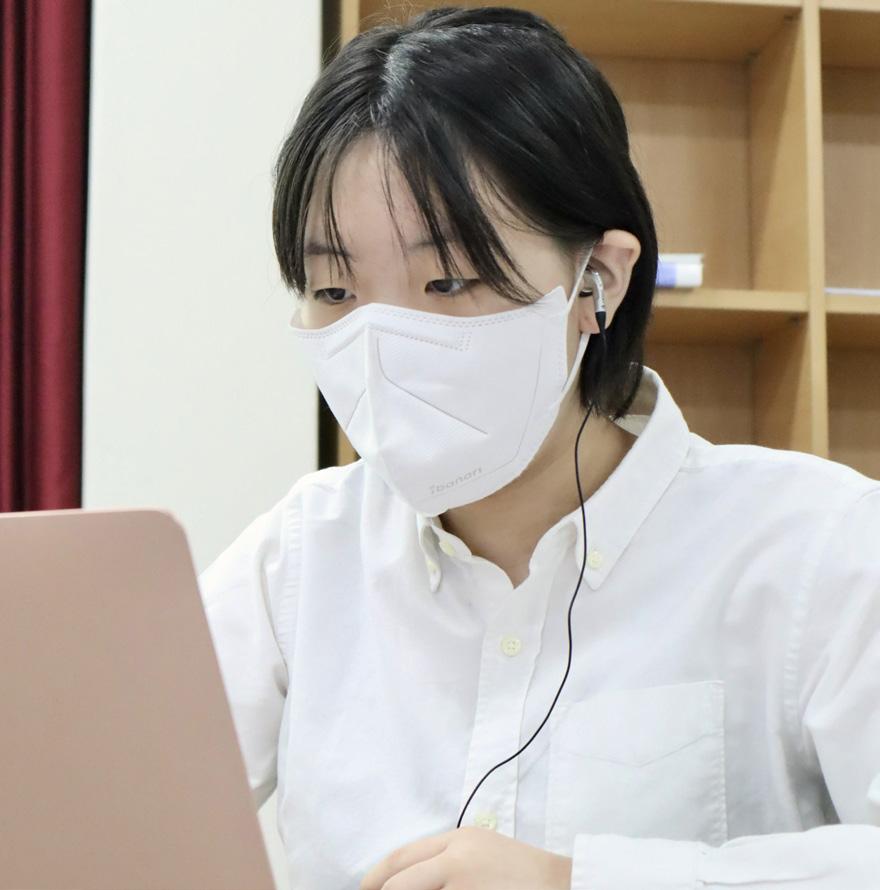
10
Written by Lucy Jang
Photo by Kristina Kang
Layout by Hannah Kim
SC CONSIDERS HUMANITARIAN AID FOR AFGHANISTAN’S NATIONAL UNITY
On the second day of SEOMUN XXV, the Security Council (SC) focused on combating instabili ty in Afghanistan. One of the main considerations made in the resolution was whether Afghan refu gees should be taken into foreign countries. Fur thermore, the delegates considered the humani tarian aid that could be provided to the refugees. Submitted by several delegates, the resolution led to disputed responses, as many delegates believed it needed many changes while the co-submitters of the resolutions attempted to defend the resolution.
Many delegates emphasized that the current res olution does not focus on the consensus of multi ple countries, but rather on the prosperity of a sin gle country, going against the purpose of the UN. Throughout the debate, many delegates believed that the resolution could be enhanced through amend ments that urge the support of international missions as, in the current resolution, only the submitters— mainly the delegate of Turkey—could benefit from it.
“I believe that there need to be very heavy amend ments and changes in order for this resolution to be even remotely useful, much less passed,” said Yeo chel Yun, the delegate of France. “For example, 5f, g, h, and all of clauses 6 and 7 are absolutely absurd. It does not make sense to use the struggling nation of Afghanistan as a way to prop up other countries’ cur rencies such as the Chinese yuan and the Turkish lira.”
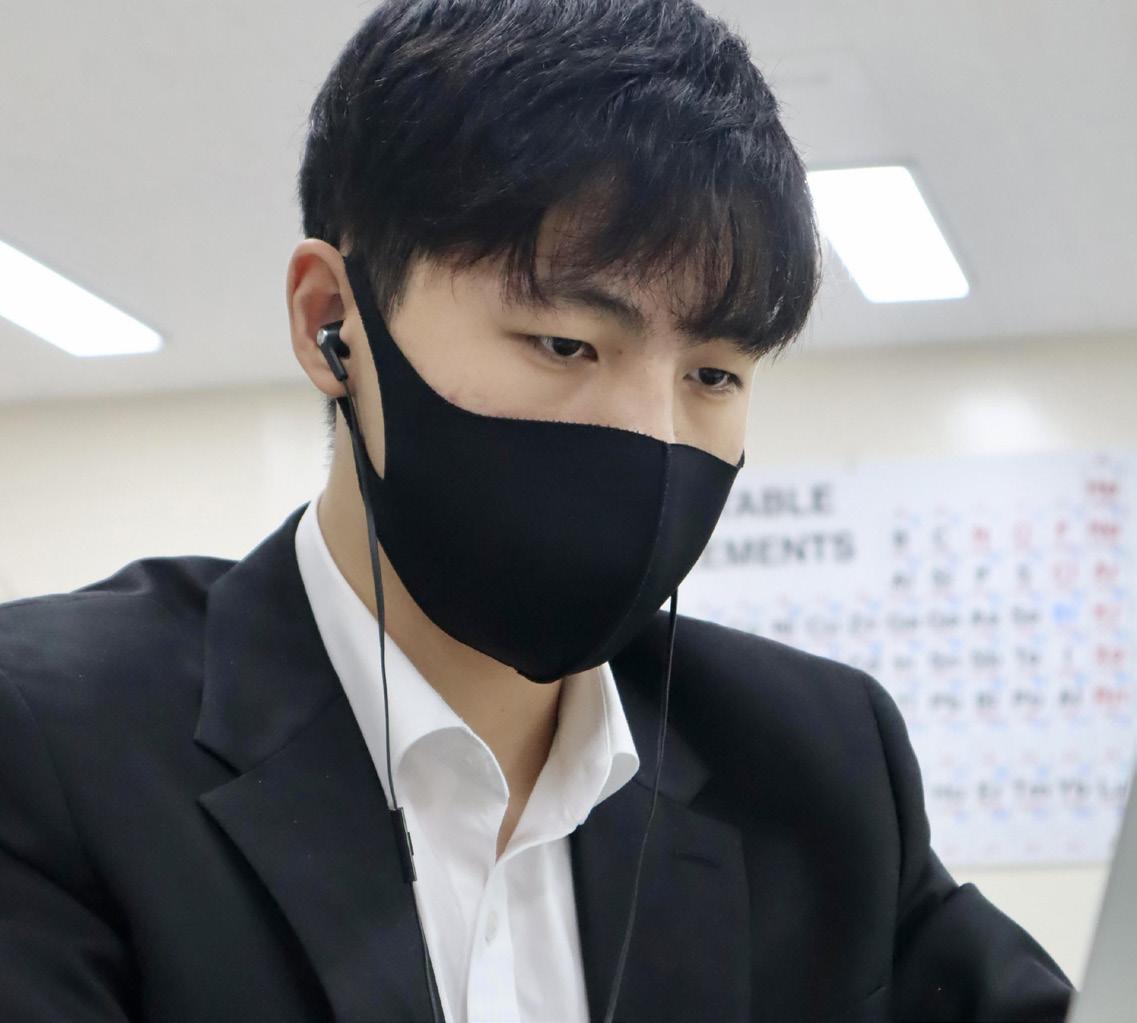
While some delegates felt that the resolution could not be saved, there were others that were more hope ful and provided constructive criticism for it. They believed that some clauses, solely benefiting the submitters of the resolution, should be heavily re vised to become an effective and practical resolution.
“I believe that this resolution needs some amend
ments since there are quite a few clauses that all countries can not come to an agreement with,” said Anant Vikram Agarwal, the delegate of the United Kingdom. “A specific example would be sub-clause 5, which clearly benefits Turkey. Rath er than focusing on the prosperity of one coun try, we should aim for all countries to prosper.”
After a fierce debate on the resolution, the submit ters accepted the changes the delegates proposed. To provide humanitarian and military aid to Afghanistan so that its sovereign and national unity are enhanced, amendments outlining cooperation among intergov ernmental organizations were passed. This further helped ensure that countries other than the submit ters of the resolution would be able to benefit from it.
“I believe that amendments and changes were critically needed for Clause 4 because it was far too beneficial towards China. Amendments must be made to benefit other relevant nations to help them counteract the high levels of power China possess es over Afghanistan,” said Timothy Kim, the dele gate of the Republic of Turkey. “It is clear in this res olution that Afghan refugees in Turkey are of critical concern and to help them is of utmost importance.”
The discussion in the SC was quite divisive but managed to settle down with amendments to the resolution. Many delegates in the commit tee emphasized that with the original resolution, the relationship among the countries would like ly worsen but the adjustments made to it helped simmer down potential international tensions.
11
Written by Kris Son
Photo by Kristina Kang Layout by Hannah Kim
THE LEGALIZATION OF ABORTION
The practice of abortion was first created back in 2700 BC in China. Although there is little information available about the extent of China’s abortion laws, other documents from early civilizations like Assyria also cover the necessity of women producing fit newborns. The severity of the punishments depended on various societal, political, and religious grounds, although harsh punishments were only given to women who received an abortion against their husbands’ wishes. Moreover, the methods of abortion primarily included non-surgical methods such as the use of abortifacient herbs and sharp instruments or even the application of abdominal pressure through physical constraints. In modern society, although the advancement of medical procedures and technologies allow a safer and more convenient environment for this practice, the legalization of abortion remains controversial.
In the contemporary world, restrictions for abortion vary among countries. According to the World Health Organization (WHO), 73 million abortions occur worldwide, equating to approximately 39 abortions per 1000 women globally.
Furthermore, a study from the Guttmacher Institute—a research organization that aims to improve sexual rights globally— and WHO illustrates that there are similar rates of abortion between countries that have legalized abortion and countries that have not. This data shows that even if abortion were to be banned, abortion would continue to take place in an undesirable and unsafe manner. However, why do abortion laws continue to be enforced and even become more stringent?
Recent debates regarding the overturning of Roe v. Wade in the US serves as an optimal example depicting the controversy of abortion and placing the spotlight of global attention on women who deem this law unjustifiable to women’s dignity and equality. The Supreme Court claimed that women do not have a constitutional
right to decide whether they can have an abortion under any legal documents. This decision raised an uproar of protests among advocates of abortion, who began to question the legitimacy of the Supreme Court for overturning a 50-yearold federal constitutional right that directly affects the 167.5 million women in the US. Moreover, they cited instances of life-ordeath situations to support the argument that abortion rights are necessary. For example, emergent pregnancies that threaten the mothers’ lives or accidental pregnancies of victims of rape are when abortion becomes crucial to save their lives.
All in all, the controversy surrounding abortion cannot be resolved by either its legalization or illegalization because various moral, societal, and religious nuances are involved, and countless cases of exceptions exist. It is of utmost importance to reach a common ground for both the supporters and opponents of abortion to settle conflicts and establish a safe environment for future generations of women.
Written by Lin Chiang Layout by Kaylee Kim
12
THE ENDURING CONFLICT BETWEEN PRO-CHOICE AND PRO-LIFE
For decades, the controversy surrounding abortion has been the center of discussion in the US. The reform of abortion laws stemmed from concerns over the consequences of illegal abortions and healthrelated issues, with pro-choice advocates enjoying victory with the Roe v. Wade decision by the Supreme Court,
which decriminalized and legalized abortion in certain states. But the overturn of Roe v. Wade earlier this year has once again pushed abortion rights into a precarious position.
The abortion rights movement taking place in the US advocates legal rights to women to receive abortions. The movement consists of a variety of organizations, such as abortion providers like Planned Parenthood, a nonprofit that provides reproductive healthcare in the US and is one of the main supporters of womens’ abortion rights. Pro-choice advocates define pregnancy as a medical issue and emphasize the importance of making abortion widely accessible as this reduces the chances of women receiving illegal abortions and endangering their health. They also stand for reproductive freedom in general and believe that legal abortions under medically safe conditions are what women need in order to prevent the deaths caused by illegal procedures in areas where abortions are prohibited. Almost 90 percent of abortions in countries with liberal abortion laws are considered safe compared to the 25 percent of countries where abortion is banned. Also, according to the World Health Organization (WHO), 5-13 percent of maternal deaths worldwide occur from the complications of unsafe and illegal abortions.
Pro-lifers, or people who do not support the act of abortion, disagree with most medical authorities about the definition of pregnancy. They consider the unborn as innocent human beings and highlight the importance of upholding human rights by banning
abortion. Also, dealing with the issue of pregnancies caused by rape or mothers with tough circumstances, pro-life advocates believe that since abortion compounds the violence of rape by manifesting it in the form of a vulnerable human being, the mother and child should receive the support and care in the midst of this unfair and painful situation. However, they oppose terminating the fetus in the womb because they believe that doing so would violate its right to life, even when it was created without the consent of its mother. Religion also plays a big role in the pro-life movement. The movement in the US originated in Catholic opposition to the liberalization of abortion laws beginning in the 1950s, and accelerated after 1973 when abortion was legalized nationwide by the Supreme Court. The vast majority of pro-life protests continue to include a religious component. This does not mean that religion is the sole source of support for the movement; pro-life protest has always included activists and organizations that stood outside of the religious influence.
The debate between “pro-choice” and “pro-life” is an ongoing controversy that touches on many aspects of women’s lives and societal institutions. These terms themselves are considered loaded language because they frame the corresponding position in terms of inherently positive qualities. More neutral alternatives such as “proreproductive rights” and “anti-abortion” have also been used.
Likewise, people should take into consideration the gravity of the debate when discussing abortion rights. By understanding and attentively listening to where each side comes from, society will be more likely to reach a compromise on this enduring conflict.
13
Written by Lucy Jang
Layout by Kaylee Kim
HSC DISCUSSES ISRAEL-PALESTINE DISPUTES
On the first day of SEOMUN XXV, the History Security Council (HSC) fruit fully discussed the agenda at hand: the partition of Palestine in 1947. The dele gates took into account the hostile re lationship between Arabs and Jews in the newly-partitioned states of Palestine and Israel and made efforts to propose resolutions that would coherently ad here to the desired religious freedom and diplomatic union of both nations.
The discussion commenced with a resolution submitted by Jayden Choe, the delegate of the Islamic Republic of Iran. The resolution requested the for mal evaluation of Israeli-Palestinian dis puted borders in the International Court of Justice (ICJ) and further requested the formation of the Israeli-Palestine Bilateral Committee to guide the ICJ.
“I think my resolution was overall well-aimed and built upon previously ratified and mutually recognized trea ties between government represen tatives,” Jayden said. “I hope to resolve territorial, property, and resource dis putes while designating clear geograph ical boundaries between the nations.”
On the other hand, other delegates focused on different agendas, such as the delegate of China, who proposed a resolution regarding the War On Terror in 2001, recommending stricter border control and government accountability

to UN recognized terrorist organizations. This resolution received overwhelming support from other nations who had shared coherent ideas in resolving in stances of physical harm on the border.
“My stance as the delegate of Saudi Arabia is a positive stance towards com batting terrorism, and I support the res olution submitted by the delegate of China,” said the delegate of Saudi Arabia. “I’m trying to create a resolution with my teammates that effectively combats terror ism while also preserving the safety of in nocent civilians and the safety of nations.”
Nick Park, the delegate of Japan, agreed with the clauses listed in the resolution proposed by the delegate of China; how ever, the delegate believed the resolution lacked specific measures to preserve the goal of maintaining peace and recom mended the addition of another clause.
“As for Japan, our stance is pretty simi lar to that of the other delegates, which is to eradicate all forms of terrorism,” Nick said. “However, I think it would be more effective if the UN could deploy peace keeping operations and troops to as sist government troops on the border.”
Overall, the first day of debates was a success, with an overwhelming ma jority agreeing with the resolution proposed by the delegate of China.
14
Written by Lin Chiang
Photo by Dana Chung Layout by Silvia Lee
SPT AIMS TO RESOLVE INTERNATIONAL TENSIONS
With the commencement of SEOMUN XXV, delegates of the Six Party Talks (SPT) targeted growing economic and ter ritorial issues among member states. Each delegate was divided into groups to support common goals of interest. All three agen das simultaneously focused on the topic of negotiating an end to the Korean War.
While Agenda 1 focused on the identifica tion and resolvement of internal and exter nal issues that plagued the North and South reunification effort, Agenda 2 was founded upon the issue of the economic and political conflicts between the Republic of Korea and Japan that were potentially stalling reunifi cation efforts. Lastly, Agenda 3 focused on resolving territorial disputes through diplo matic means. Alexander Kameoka, the del egate of Japan, favored Agenda 2, support ing a much more tacit, peaceful approach.
“We can encourage North Korea to rejoin the SPT, thus facilitating denuclearization, and we can solve this issue of Japanese citi zens being abducted by the North Korean government,” Alexander said. “This sit uation that we are currently in harms everyone involved, and the only way out is to try something we have not tried before such as incentives.”
Even delegates from dif ferent agendas within the committee were all in favor of diplomatic means to resolve tensions between member nations, whether that issue be territorial or economical. The delegate of Russia, Wan nachi Suerte, was especially concerned about the growing territorial disputes with Japan.
“I think that resolving ter ritorial disputes is crucial in order to establish international stability. The Dokdo/Tsushima Island conflict
has repeatedly resulted in diplomatic breakdowns due to the escalation of the issue,” Wannachi said. “For Russia in particular, with Sakhalin Island and the Kuril Islands being disputed with Japan, the delegate of Russia believes that de fac to control over certain terri tories should be respected.”


The chairs, however, held a very different view of the Agendas. They believed that while cooperation between na tions was necessary to achieve effective negotiations between the six nations, this process was too complicated due to the strong opin ions held by each participating nation.
“Agenda 3 is not an easy agenda to reach a compromise on because there are stark differences in the stance of all six nations in the Six Party Talks on this contentious topic,” said Hyueneung Cho, the Deputy Assistant President. “In general, a lot of top ics in SPT are hard to reach a compromise because they encourage extremely differ ing stances among the member nations.”
15
Written by Jiyu Hong
Photo by Dana Chung Layout by Silvia Lee
ENV REVISES AMENDMENT TO SAVE CORAL REEFS
On the second day of SEOMUN XXV, delegates from the Environmental Commission (ENV) passed numerous amendments that aimed to prevent further ocean acidification, wildlife trafficking, and deforestation. In the resolution, one finely-revised amendment was proposed by the delegate of Germany, which aimed to foster selective breeding programs for coral reefs.
One major question that delegates constantly held about this amendment was whether saving coral reefs would increase marine biodiversity or ruin the natural environment of marine animals. Also, delegates questioned whether the end goal was to increase marine life biodiversity or to simply save corals. These questions presented opportunities for Brandon Choi, the delegate of Germany, who created the resolution, to clarify his stance and purpose of his amendment.
“My reasoning for this amendment was to prevent coral reefs from dying out, which are bastions of diverse marine life,” Brandon said. “Serious negative outcomes from genetic modification could potentially be avoided if delegates place heavier emphasis on the technicalities of selective breeding for coral reefs, which ended up convincing most delegates that my amendment was feasible. Coral reef biodiversity could be decreased by selective breeding, but the priority should be keeping organisms alive to prevent extinction. The risks of selective breeding and genetic disorders must be addressed by scientists’ extensive testing before being widely implemented in ecosystems.”
Many delegates agreed with the delegate of Germany’s stance, agreeing that it was important to base decisions off pre-established science and find ways to save coral in the fight against ocean acidification. Yet, a couple of delegates questioned whether genetic mutations would be safe in corals that live in unpredictable waters.
“When it comes to scientific research, precautions must be taken,” said Saewoong Ian Park, the delegate of Turkey. “Simply claiming that these solutions are viable because they are effective in the experimental stage does not mean the same results would be achieved in a non-lab setting. In the natural world, there are potentially many different confounding variables. Also, selective breeding programs could potentially limit and harm the ecosystem, which
is the opposite of what this committee is trying to accomplish.”
Meanwhile, though the delegate of Poland stood by Germany’s amendment during the whole debate, the delegate decided to add a fourth subclause to reinforce accountability in the scientific community, which aimed to create an international code of conduct on which nations would be allowed to conduct selective breeding programs.
“I thought the initial clause lacked feasibility because only consulting with ethics panels and scientists does not ensure a whole international agreement on the extent to which genetic engineering and selective breedings can be done,” said John Kim, the delegate of Poland. “By creating an international code of conduct, all nations can access the results of the discussion with the ethics panels and follow international standards accordingly, which would result in greater feasibility.”
Overall, these productive debates resulted in a revised amendment. The amendment ended up stating that pre-existing research on coral reef properties would be utilized to genetically engineer traits in coral that would withstand ocean acidification. Also, in response to concerns over selected traits, the delegate affirmed that ethics panels and scientific organizations would help regulate any selective breeding programs to ensure that they were ethically sound.
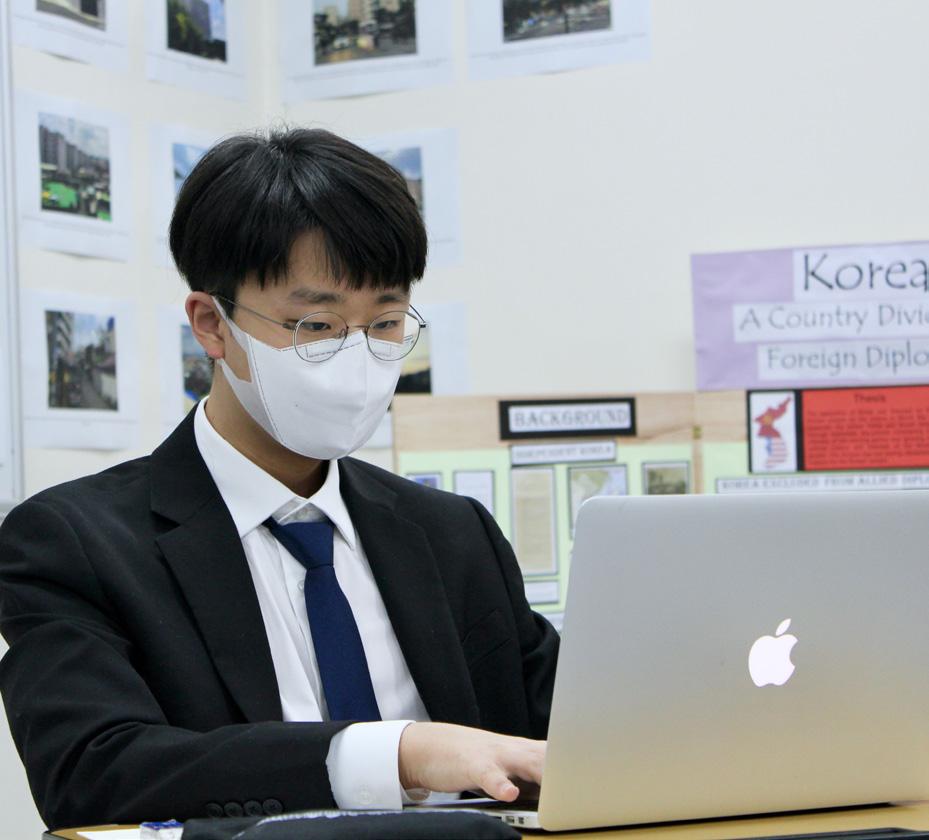
16
Written by Sean Kim
Photo by Celine Yang Layout by Luna Moon
CSW DISCUSSES WAYS TO CREATE SAFE SPACES FOR WOMEN
On the second day of SEOMUN XXV, delegates from the Commission on the Status of Women (CSW) started off by delivering opening speeches about harassment and healthcare. Delegates began the debate by discussing the lack of adequate healthcare for women and the insufficient levels of education provided for men in the military. The amendments passed predominantly revolved around the education of men, reduction of gender segregation, and the creation of safe spaces for female victims of sexual abuse. Today’s debate focused on the topic of military camps where women could have security and protection from sexual abuse.
As the delegates debated issues revolving around women’s rights, Erica Lim, the delegate of Argentina expressed how Argentina experienced an increased number of sexual abuse cases followed by the measures Argentina took to handle the pressing social issue of sexual abuse.
“Throughout the years in CSW, Argentina has progressed forward in achieving gender
equality significantly,” Erica said. “For example, through the help of the CSW, Argentina has launched the Nation Action Plant to prevent and end violence against women from 2017 to 2019. Argentina also created a Femicide Registry and Federal Council for combating trafficking and exploitation for victim protection and assistance.”
The amendment proposed by the delegate of Argentina additionally stated ideas related to preventing violence by educating men in military camps. Similarly, other amendments created by Russia and Chile were also related to the idea of preventing violence. Throughout the debate there was tension continuously between the countries about how to improve the safe zones. Some wanted men to get educated near the zones while others wanted men to be allowed in them. These diverse ideas were all included in the amendments that delegates prepared. Daniel Shin, the president of the CSW, shared his ideas on the amendments.
“Delegates are raising pretty important amendments to combat the discrimination of women in conflict zones,” Daniel said. “They have debated on whether the suggested seminars will help to rid deep-rooted stereotypes, which are the tissues at the core of the agenda.”
As the debate went on, delegates began to recognize the problem of lacking conflict zones and failing to provide women in the military with security. The debate sparked ideas of how to establish safe spaces for women that provided therapy and healthcare and creating a friendly environment. Germany was one of the countries willing to make changes to the country to improve living conditions for women and Yeonjae Kim, the delegate of Germany, explained how this would be accomplished.
“The CSW is deeply related to Germany because Germany is a country that aims towards gender equality in all aspects of society,” Yeonjae said. “Because Germany has not reached a state where women and men are fairly balanced, Germany continues to participate in this committee in order to improve the country.”

17
Written by Ellen Park
Photo by Celine Yang
Layout by Luna Moon
TENSIONS AND MISTAKE DEFINE SPC’S SECOND DAY
Withthe commencement of the second day of SEOMUN XXV, the Special Conference Commit tee (SPC) had multiple insightful amendments pro posed. While enriching debates about the amend ments took place among delegates, tensions also flared.
The delegate of Argentina proposed an amendment that reinforced privileges granted at the discretion of the host nation of the migrant workers. The amendment stated that a company and country are not allowed to retract hospitality towards migrant workers and will be punished if they do so under certain circumstances: prolonged illness, unexpect ed economic recession, job outsourcing, or evident discrimination-based job denial. This amendment caught the attention of many delegates and was de bated upon with great controversy.
“I created the amendment based on what I saw as a possible loophole that could be exploited,” said Tyler Castaño, the delegate of Argentina. “I want ed the resolution to pass, given the value it holds, and therefore created the amendment to remove possi ble opposition to the resolution as a whole. I defend ed the amendment through cooperation with several of my fellow delegates, attacking the basis of the op posing arguments.”

While opposing delegates recognized the potential loophole in the original resolution regard ing companies treating migrant workers equally, delegates still argued that making this amendment vague would only murk regulations and confound companies.
“The amendment proposed by the dele gate of Argentina had multiple points of weakness,” said Kate Galkina, the delegate of New Zealand. “As mentioned by the delegate of France, the time peri od of unemployment was far too vague, and it does not elaborate on whether or not migrants with con ditions or disabilities will be allocat ed more time. Additionally, the amendment has no clear definition of how discrim ination against migrant workers will be judged or seen.”
Other opposing delegates took a sim ilar
stance as New Zealand. Certain delegates were wor ried that without the timeline for prolonged illness and evident discrimination-based job denial being defined, companies would exploit the unclear lan guage of the amendment to oppress migrant workers. Even with these complaints of how certain sub claus es were defined, however, delegates who believed that the amendment had defined its conditions clear ly enough rallied and argued that this amendment was essential in elaborating the circumstances that companies could not exploit.
“The delegate of the United Kingdom is for the amendment proposed as it ensures that all mi grant workers are working to the best of their ability instead of depleting nation resources, like free hous ing, financial and legal aid, and healthcare,” said Sa maira Singh, delegate of the United Kingdom. “The amendment proposed is imperative to ensure gov ernment resources are not taken advantage of and are used to ensure migrant workers are given privi leges based on their activities with the system.”
After the debate was concluded, the amend ment was voted on by a total of 18 countries—elev en in support and seven against. Even though the amendment reached the required majority threshold to pass, confusion caused by the delegate of France, who believed amendments required 60 percent of the vote to pass, led to the amendment to mistakenly be struck down—with the error only recognized after the motion had passed. This mistake was both a great learning and memorable experience for the commit tee and delegates.
18
Written by Sean Kim
Photo by Julie Koh Layout by Ellen Ryu
ICJ AIMS TO END TENSIONS BETWEEN MARSHALL ISLANDS AND UNITED KINGDOM
On the second day of SEOMUN XXV, the Interna tional Court of Justice (ICJ) actively engaged in the debate regarding the case of Marshall Islands v. United Kingdom. Reflecting upon current disputes between nations like the Ukraine War, the debate marked the beginning of the Advocates Trial as the proponents of the Marshall Islands began their direct examination with their chosen witnesses. Both oppo nents of the trial, the Marshall Islands and the United Kingdom (UK) provided evidence and testimonies to discuss whether the UK was threatening the Marshall Islands with its nuclear arsenal.
“The Marshall Islands have strong arguments with evidence from the Exhibits,” said Woochan Kim, the Assistant President. “I think that the Marshall Is lands have been able to successfully relieve some of the burdens of proof. Examinations from the UK later will determine the fate of the final verdict.”

Emphasizing the importance of the UK’s re sponse to the Marshall Islands’ witness, Woochan val ued the use of evidence. The case, which specifically concerned negotiations relating to the cessation of the nuclear arms race and nuclear disarmament, re quired standards and boundaries to be judged atten tively. The overall flow of the debate consisted of na tions listening to both sides and judging objectively.
“From one perspective, I believe that the Marshall Islands stand on a moral ground for this agenda as they address their concerns of other na tions being unable to fulfill their roles and responsi bilities with nuclear weapons and power,” said Claire Ohk, the Judge of Guinea. “On the other hand, from the perspective of the UK, though such countries may go against their responsibilities and treaties, these nations’ actions are justified in the sense that nuclear
power provides defense and security.”
The Judge of Guinea took into consideration both the perspectives of the Marshall Islands and the UK. Discussing how the idea of a nuclear um brella—an increased possession of atomic weapons within nations that creates a norm of possessing nu clear weapons as self-defense amongst countries—is formed, opponents of the case expressed diverging opinions. As the Marshall Islands reaffirmed their sup port to fulfilling their goals, Jay Cheng, the Judge of the Marshall Islands, recognized the destructive im pacts the island faced near the Cold War and staunch ly opposed the use and development of nuclear weapons. This meant their assertive positions against the UK violated the Treaty on the Non-Proliferation of Nuclear Weapons (NPT).
“Although the Marshall Islands recognizes that nuclear disarmament is a long and arduous pro cess, it is important to not to concede, nor take any steps contrary to the goals of the NPT,” Jay said. “We strongly want to achieve our goals and thus believe that the UK should be accountable for their continu ous stance and development of their nuclear arsenal.”
With strong testimonies and evidence pre sented from both sides, the judges continued to shape their positions upon the issue.

19
Written by Charlotte Jun
Photo by Julie Koh Layout by Ellen Ryu
WHAT’S YOUR FAVORITE THING SO FAR IN SEOMUN?
“My favorite thing about SEOMUN has been getting to meet new del egates and bouncing ideas with other people from other countries and with other perspectives. The conference sometimes went through some fierce discussions; however, I believe those discussions filled me with a unique experience during the second day of SEOMUN.”
- Brandon Choi, the delegate of Germany in the Environmental Com mission

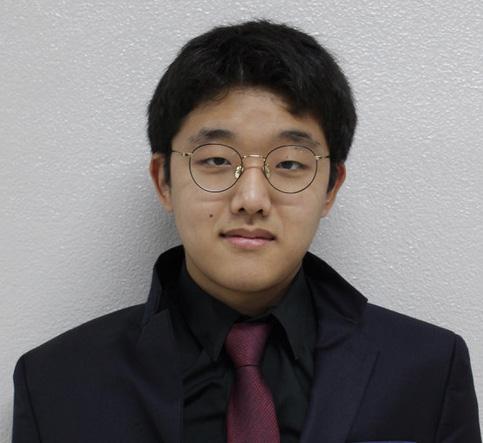

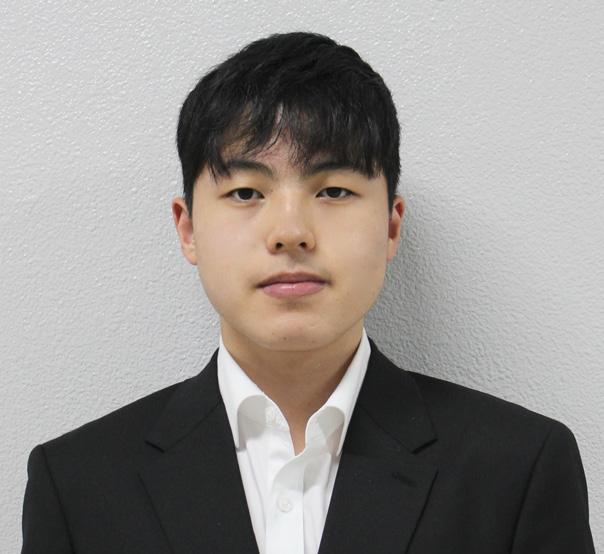
“I just generally like my experience in SEOMUN so far. I am beginning to feel more dedicated toward MUN now that I have attended this con ference especially because I am improving by learning from other del egates. I would like to improve throughout the year and return to this conference next year after fully mastering the abilities I have seen in other delegates today. I am thankful for the SEOMUN team for organiz ing this wonderful opportunity.”
- Jaeyeon Ryu, the delegate of Italy in the Security Council
“For the Security Council, I really like how all the delegates are contrib uting to the debate because, in previous conferences, it was usually just one or two really good delegates dominating while others sat in silence. Just seeing the tally sheet full of marks makes me appreciate the delegates’ hard work.”
- Jason Baek, the Deputy Assistant President in the Security Council
“I enjoy communicating and collaborating with other delegates to find solutions for several global issues. It is especially fun in my committee because there are a lot of familiar SIS students in the Environmental Commission. Having other delegates discussing with me in the class room, it is a unique experience as it is an online conference but feels like an offline conference.”
- Paul Moon, the delegate of Israel in the Environmental Commission
20
Written by Kris Son
Photo by Celine Yang Layout by Ellen Ryu
WHAT KIND OF IMPROVEMENTS WOULD YOU WANT TO MAKE FOR NEXT YEAR’S CONFERENCE?
“Next year, I wish to establish a more welcoming MUN atmosphere as a chair. With many experienced SIS delegates in my committee this year, I noticed that other less experienced delegates have not been able to participate as much, and likely not enjoy the debate. I hope to foster a more friendly atmosphere as a chair in future MUN conferences so that newer delegates can feel more welcomed in the debate.”
- Katelyn Oh, the President in the Environmental Commission
“I want to get better at knowing all of the small rules in the Rules of Procedure (ROP) for SEOMUN. Some things I do as a chair are not com pletely correct according to the ROP, and so I need to fully memorize every part of it in order to be more effective and responsible as a chair.”
- Junseo Lee, the Deputy Assistant President in the Environmental Commission
“I would like to improve on creating amendments on the spot. It is sometimes challenging to continuously generate new solutions or improve the resolution throughout the flow of the debate, and I think with more practice, I can improve on this skill.”

- John Kim, the delegate of Poland in the Environmental Commission


21
Written by Sophie Choi
Photo by Celine Yang Layout by Ellen Ryu
SEOULITE ISSUEXXV 2


































































